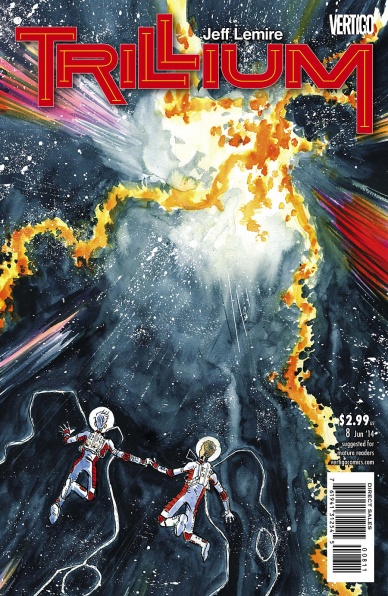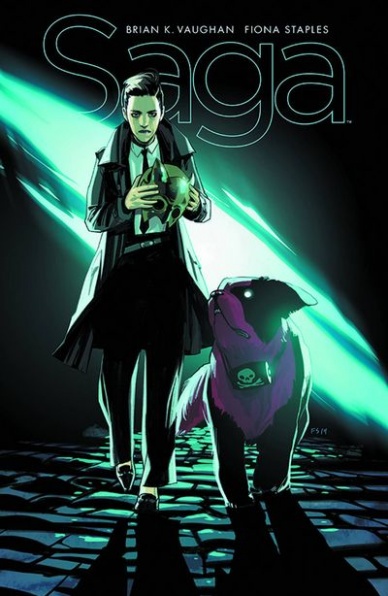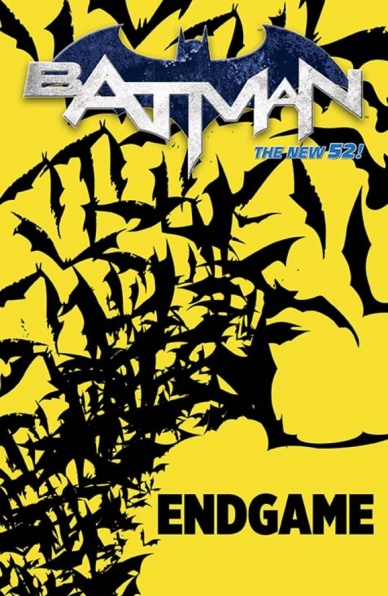
We’re nearing the end of Multiversity’s 2014 in Review segments, and today, we have one of the final three categories: Best Writer. As per usual, it was a tightly contested category. In fact, only one vote separated #1 and #2 in our rankings, making it by far the closest call when all precincts were closed.
But a consensus was made, and it’s one that’s hard to argue with really. Feel like arguing? Share who your favorite writers of the year were in the comments below and start the discussion!
Note: All of Multiversity’s 2014 in Review awards are based off of all of the contributing writing team voting to decide each rank. Every list is combined with equal points for every voter, and the results are what you find below.
Looking for the rest of our 2014 in Review entries? Find them all here.

10. Jeff Lemire
Why he made the list (Zachary Wilkerson): Jeff Lemire had a great year in 2014, but you might not have noticed. The terrific and hard working writer often seems to play second fiddle to big names like Scott Snyder or Geoff Johns. However, Lemire consistently delivers work that is on par with or surpassing the quality of his more mainstream peers. This year saw Lemire wrap up two critically lauded runs on “Animal Man” and “Green Arrow” and then masterfully segue these characters over to his new flagship; “Justice League United.” “United,” once touted as “Justice League Canada,” stood out as a quirky and lovable respite from the more traditional “Justice League.” Lemire was also one of four writers who took on the monumental task that is “Futures End,” consistently delivering some of the book’s most enjoyable parts.
Lemire’s real claim to fame this year, however, is the breathtakingly beautiful “Trillium.” I would argue that Lemire is at his strongest when he’s writing and drawing his own stories, and “Trillium” stands alongside the likes of “Underwater Welder” and “Essex County Trilogy” as a profound and emotionally relevant story.
Indeed, Jeff Lemire did some fantastic work this year, and the industry has certainly taken notice. A longtime DC Comics mainstay, 2015 will see Lemire branch out to nearly every other major comic book publisher. The “Year of Lemire,” as I’m coining it right here and now, kicks off with this week’s “The Valiant” #1. Here’s wishing the best of luck to an extremely talented writer and artist.

8 (tie). Greg Rucka
Why he made the list (Mike Romeo): Rucka’s been good for a while now, but I think 2014 was an exceptional year for him. Lazarus, the series he co-created with Michael Lark last year, has gotten better with each new arc. Rucka uses the series to explore a number of social issues and examine the ills of the modern world. He does all of this by encasing what he wants to say in the intensely emotional story of Forever, the series protagonist. Forever struggles with loneliness and longs for the acceptance of her family, who can not help but treat her as something other than blood. To complicate things further, she’s a bio-engineered killing machine who acts as the tip of her family’s proverbial spear. Like all great works, this comic is not necessarily about the events of the narrative, but more the themes and ideas it explores. Family, dedication, love, money, poverty, and inequality are just a few of the vertebrae that makes up the spine of Lazarus. There have been time where I’ve had to put the book down and have a breather because it just cut to close to the bone, either personally or socially. The fact that Rucka, through his skill as a writer, was able to grab the core of my being and shake the shit out of it ensured his place on my shortlist of the year’s best writers.
Rucka has written for a number of other series this year as well. He returned to Stumptown and co-created the horror miniseries Veil. Add to that his engaging and incredibly thoughtful work on Cyclops over at Marvel. It’s certainly been a hell of a year for the guy, and considering the entirety of his career to date, that’s saying a lot.
Continued below
8 (tie). Jonathan Hickman
Why he made the list (Brandon Burpee): Jonathan Hickman in my opinion was the best writer of 2014. Whether it was with Marvel on Avengers, New Avengers, Infinity or at Image with his own titles such as Manhattan Projects and East of West, Hickman provided more books that I enjoyed in one year than any other writer in comics. His grandiose ideas and steady plot builds are everything I want from comics. I love that even at Marvel he has been allowed to build the stories he wants to tell at his pace. It’s a credit to his talent that Marvel provides him the creative freedom that they do.
Hickman can do it all. Sci-fi, humor, action and heartfelt moments all have their place in the titles he’s written this year and they’ve all been top of their class. As good as this year has been, I truly am excited to see what he puts out next year. So many promising offerings on the horizon. Between Secret Wars which looks to redefine Marvel in a big way and his plans to relaunch Manhattan Projects in a new direction, Hickman appears to be charting a course for further greatness. I can promise you I’ll be along for the flight.

7. Brian K. Vaughan
Why he made the list (David Harper): Poor BKV. The guy very well might be suffering from voter fatigue at this point, as he had yet another banner year with “Saga” continuing on its (not so) merry way and “The Private Eye” nears its end in spectacular fashion. But there’s no voter fatigue in my book.
No sir.
BKV finished #1 in my rankings and #1 in my heart, as he does such a tremendous job of delivering characters with real personalities without making them feel like extensions of himself, while also delivering some of the most inventive and exciting plots in comics. In moments like (redacted), you can’t help but feel your heartbreak. In others, like (redacted), you want to get up and cheer. BKV’s a powerful guy, in that regard, making us feel what the characters feel. He’s like a great orchestra conductor, except he uses his powers to twist and turn our emotions with the greatest of ease. After (redacted), I felt like he was the world’s greatest monster, but then I realized the fact he can make me feel that way is why he isn’t that, but the world’s greatest comic writer. It can be so easy to mix the two, though.

6. Warren Ellis
Why he made the list (Vince Ostrowski): 2014 was hailed by some as the “return” of Warren Ellis. In reality, the man never left comics, even as he was expanding out further into prose. But I suppose you could call 2014 a perfect storm of Warren Ellis’ work in comics, as he made 3 major contributions to the comic stands and each one was just as strong as the next. Each of them flexed a different one of Ellis’ writing muscles.
First was “Moon Knight”, a short six-issue stint that operated more as 6 tenuously-linked vignettes featuring Moon Knight’s unique brand of crime fighting. Ellis chose to move away from the multiple-personalities motif of Bendis’ prior series, and instead focused Marc Spector’s character quirks into an enigmatic and highly eccentric character. The idea that Moon Knight is Marvel’s “Batman” was perhaps taken to the extreme – Spector became even more engrossed and obsessed in the Moon Knight persona than most depictions of Bruce Wayne have. Ellis also smartly stood back and allowed artist Declan Shalvey to take over large portions of the narrative and tell the story in a predominantly visual manner. “Moon Knight” was perhaps Ellis’ most economic writing job yet – and perhaps his strongest collaboration in corporate comics yet.
Likewise, we got “Supreme: Blue Rose”, another re-imagining of an established cast of characters into an unexpectedly enigmatic narrative. While Tula Lotay was the revelation here, this was Ellis at his most intensely obscure. Kudos to Rob Liefeld for continuing to let great writers and artists take his creations away and run wild with them. Just as with “Prophet”, “Supreme: Blue Rose” takes a previously simple and (intentionally) derivative product and finds multiple ways to repackage those ideas into something engrossing and novel.
Continued belowFinally, and most triumphantly, “Trees” was Ellis’ latest in a storied line of longform, creator-owned storytelling. “Trees” begins with the premise that the world has been covertly invaded by a mysterious “alien” race embedding itself in the planet and manifesting externally as massive tree-like projections from within the earth. In reality, “Trees” was Warren Ellis at his most content to just be himself and explore the things that he’s clearly been thinking about lately. Most importantly, it features some of the most frank and overt musings on transgender issues that I can remember seeing in mainstream comics. Basically, “Trees” is a soundboard in comic form, that also happens to contain a compelling science fiction mystery that moves along at its own pace. I’m not sure it’s “Transmetropolitan” yet, but it certainly feels like Ellis at his most comfortable and self-assured.

5. Scott Snyder
Why he made the list (Matthew Garcia): I think one of the strongest developments I saw in Scott Snyder’s writing in 2014 was a willingness to trust his artist more with the story. Not to say that he wasn’t a strong collaborator or didn’t give his artists their due before or anything, but more, that he started figuring out when was the best times to sit back and let Capullo or Murphy or Jock run wild. He’s gotten better at incorporating his text with the images, and the caption boxes don’t repeat what we’re seeing, but rather help amplify them. The montages of adventures in “The Wake” work because Sean Murphy gives this sense of scale and excitement, while Snyder pulls back to talk about mers or myth. The scene in ‘Zero Year,’ when Batman goes to face down The Riddler, has a better resonance because Batman’s finally learning what he needs to do to be Batman, while Capullo delivers a mighty hero’s march juxtaposed with deploying jets. (This wasn’t really true for “Superman Unchained”, though. I chalk up a lot of my problems with that book with Snyder not sure how to approach talking to his boss.)
Sometimes, Snyder’s ambition exceeds the story he’s working on, and I think that can lead to him sort of stumbling through the ending (“Superman Unchained,” “The Wake”), but I appreciate and like that he wants to challenge us as readers to have something more complicated and epic in our big budget blockbuster comics, with all sorts of narrative threads running through the pages. Also, his continued attempts to exploit the arrogance and fears of characters has helped make them more interesting to watch. He relies on archetypes, yeah, but he plays with that type just enough to make you follow that character’s actions and care about them.
This exploitation of arrogance and the fears of the characters probably stems from his love of horror stories, but I think his strength is much more evident in adventure stories. Old school romances in a new school setting. His strongest works of the year — Part Two of “The Wake” and “Batman: Zero Year” — brilliantly illustrate how much better he is when he’s not trying to scare us but thrill us.

4. Matt Fraction
Why he made the list (Brian Salvatore): For Matt Fraction, this was a down year: his “Inhumanity” didn’t work out, nor did his “Fantastic Four” run; in total honesty, I don’t know one person reading “Satellite Sam.” However, on the basis of 12 issues released (as of press time), the remainder of his work absolutely merits him a place on this list. Five issues of “Sex Criminals,” where he took what could have easily been a one note concept and developed it into one of the funniest and most heartfelt books in comics; six issues of “Hawkeye,” where he continued to craft the definitive Clint Barton story; one issue of “ODY-C,” a radical re-imagining of The Odyssey – this is all he needed to do in 2014 to be considered one of the best writers of the year.

3. Ed Brubaker
Why he made the list (Matt Dodge): 2014 has been quite a year for Ed Brubaker. He had three separate series ongoing throughout the year, and, together with frequent collaborator Sean Phillips, sent shockwaves through the industry by signing a ground-breaking deal with Image, giving them effective carte blanche for the next 5 years. Brubaker rose to his position as one of the leading figures in independent comics due to his commitment to creating unique and original characters. Whether it be the supernatural noir of “Fatale”, the thrilling espionage of “Velvet”, or the seedy glitz of “The Fade Out”, what keeps readers coming back are Brubaker’s complex and multi-faceted characters.
Continued belowWhile Brubaker has put in time at the Big Two companies, and even had a Captain America movie based on one his stories, it is his independent work that has shown the extent of his creative talent. Despite the fact that there is no chance of Wolverine popping up, Brubaker stories are filled with revelations and unexpected diversions, which all feel naturalistic and engaging. Each of Ed Brubaker’s series creates a new world, and comic fans should keep exploring them for as long as possible.

2. Jason Aaron
Why he made the list (Brian Salvatore): More than almost anyone in comics, Jason Aaron has an invisible touch. I’m not referencing a Genesis song, but I am referring to his ability to inhabit each story so utterly and completely that the only way to know it is an Aaron story is to marvel at its excellence. This year, Aaron launched “Men of Wrath” and “Southern Bastards,” made Thor a lady, successfully resurrected Nightcrawler, and killed the Watcher. And yet, no two of those books had anything close to a shared aesthetic.
Aaron is a storyteller in the purest sense of the word – he does what he needs to do to bring the specific story you’re holding your hands to life, and doesn’t feel the need to bring any baggage or cute little tricks to the table. Because of that, he is often the first writer I tell new fans to take a look at, because I know he won’t let anything get in the way of knocking whatever he’s writing out of the park.

1. Grant Morrison
Why he made the list (Keith Dooley): Grant Morrison brought his usual unique blend of intelligence and mind expanding ideas to his writing in 2014. “The Multiversity” miniseries was not only a love letter to the DC Universe, but it demonstrated the power and magic of the comic book medium. He showed us the endless possibilities inherent in the art form and, as usual, gave us examples of how comics can do things that no other medium can accomplish. This was especially evident with “The Multiversity: Pax Americana”, which ended up being what I (and many of the site’s staff) consider to be the best single issue of the year. Artist and frequent collaborator Frank Quitely brought that issue to glorious life, confounding us while coaxing us to explore the boundless possibilities of time and space itself. Morrison, with artist Frazer Irving, also began another perfect opus with the miniseries “Annihilator”. With both of these limited series, Morrison proves again that he is the consummate collaborator by bringing out the best in the artistic teams of each issue of both “The Multiversity” and “Annihilator”.
Most writers are unable to sustain greatness over several years. Some, if they’re lucky, can only create one or two masterpieces worthy of the cannon. Morrison is still surprising, inspiring, and moving us after almost thirty years. He continues to challenge himself to reach greater heights of enlightenment and, at the same time, bring his readers along on the same journey. With the two miniseries he began this year extending into 2015 and other projects planned for the new year, it’s almost guaranteed that we will see him rule above all writers again next year and, hopefully, for many more years to come.






